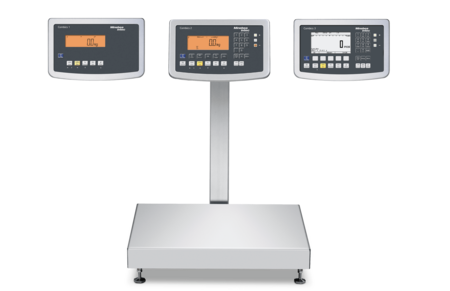Just How Commercial Scales Job: A Thorough Review for New Users
Comprehending the auto mechanics behind industrial scales is crucial for new individuals that want to guarantee precision in their measurements. As we discover these parts, one must take into consideration exactly how these aspects engage to enhance performance in diverse commercial applications.
Basics of Industrial Scales
Industrial ranges are essential devices utilized across different markets, including production, logistics, and agriculture, to guarantee exact weight measurements of hefty lots. The basic principle behind industrial ranges entails the conversion of weight right into a quantifiable type that can be displayed electronically or analogically. These ranges use different devices, such as tons cells or mechanical levers, to determine the weight of items placed upon them.

In addition to their dimension capabilities, commercial scales are made to endure extreme atmospheres, including durable building and construction that stands up to dust, dampness, and heavy effects. Calibration and upkeep are essential to make sure accuracy, as even small disparities can lead to substantial financial implications. By understanding the fundamentals of industrial scales, individuals can appreciate their value in numerous industrial applications.
Kinds Of Industrial Scales
Various sorts of industrial scales accommodate the diverse requirements of different industries, each created to deal with certain evaluating jobs with precision and dependability. Among the most usual types are flooring scales, which are perfect for considering cumbersome and heavy products. These ranges normally feature big platforms and can fit palletized products, making them essential in stockrooms and delivery centers.
Another kind is bench ranges, which are typically used for smaller products in production and retail setups. They supply exact measurements for items that require accuracy, such as chemicals or components in production line (Industrial Scales). For mobile operations, portable ranges use flexibility and simplicity of transportation, appropriate for fieldwork or short-lived installations
Furthermore, specialized scales like checkweighers are utilized in production lines to maintain top quality control by making certain that products fulfill weight requirements. Each type of commercial range plays a vital function in enhancing operational efficiency and accuracy across numerous fields.
How Considering Mechanisms Work
Weighing systems are important parts that make it possible for precise measurement of mass throughout various industrial scales. These mechanisms use various concepts of physics and engineering to give accurate weight analyses, important for supply management, high quality control, and conformity with regulative criteria.
One usual kind of weighing device is the load cell, which operates on the concept of strain assesses. When a tons is used, the load cell deforms somewhat, creating an electric signal proportional to the weight. This signal is then exchanged an understandable weight measurement by the range's electronic devices.
Another commonly made use of mechanism is the mechanical equilibrium, which utilizes a system of levers and weights. Industrial Scales. This technique counts on the principle of stability, where the weight read this of the object being determined is balanced versus understood weights, enabling direct measurement
In addition, hydraulic and pneumatic scales utilize fluid dynamics concepts to determine weight. These systems use the pressure applied by a tons to identify weight, supplying high precision for enormous tons.
Correct Use Strategies
When utilizing commercial scales, sticking to appropriate use methods is crucial for ensuring accurate measurements and preserving devices honesty. Primarily, it is vital to pick the appropriate scale for your certain application, as ranges differ in ability and precision.
Prior to evaluating, make sure that the scale is positioned on a stable, degree surface area complimentary from disruptions or resonances. This will certainly assist to lessen errors brought on by exterior elements. Additionally, adjust the range according to the manufacturer's specs before make use of, ensuring that it is operating appropriately.
When putting things on the range, distribute the weight evenly to avoid tipping or harming the equipment. Constantly enable the scale to this maintain before recording the weight, as variations might occur throughout first placement. For bulk products, utilize containers that are proper for the range dimension to stop overloading.
Furthermore, avoid placing extremely hot or cool things straight on the range, as temperature level variations can influence accuracy. Maintain the weighing platform complimentary and clean of debris to stop contamination and guarantee trustworthy results. By following these techniques, customers can make best use of the efficiency and durability of their commercial ranges.
Maintenance and Calibration Tips
Making sure the longevity and accuracy of commercial scales calls for thorough maintenance and normal calibration. A precautionary maintenance schedule is crucial; it ought to include routine assessments to determine deterioration, particularly on tons cells and various other sensitive parts. Routinely cleansing the scale's surface area and making sure the bordering location is cost-free from debris will certainly help preserve its stability and performance.
Calibration is equally important and need to be done at regular intervals or whenever the scale experiences significant modifications in temperature level, humidity, or physical variation. Make use of certified calibration weights that are traceable to national standards for precision. Record each description calibration session meticulously to track efficiency over time and identify any kind of patterns or reoccuring concerns.
Train all drivers on appropriate range use and upkeep methods to make sure constant performance and precision. By adhering to these upkeep and calibration tips, customers can enhance the integrity of their commercial scales, making certain optimum operation in any kind of setup.
Conclusion

Recognizing the auto mechanics behind industrial scales is crucial for brand-new users that want to make certain accuracy in their measurements.Industrial scales are necessary devices utilized throughout numerous fields, including manufacturing, logistics, and farming, to make certain exact weight dimensions of hefty tons. The basic principle behind commercial scales involves the conversion of weight right into a measurable form that can be displayed digitally or analogically. By comprehending the essentials of commercial ranges, individuals can appreciate their relevance in various industrial applications.
In conclusion, comprehending the procedure and maintenance of industrial ranges is important for making sure precise weight measurements in various applications. (Industrial Scales)